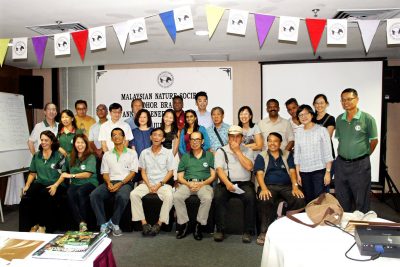
In 1940, British expatriates, mostly managers of plantation estates, saw the importance of documenting Malaysia’s rich and vast tropical environment for the good of the country. Being nature lovers themselves, they accumulated notes from their own field studies and observations, wrote these out scientifically and published their material into a simple black and white magazine called the Malayan Nature Journal (MNJ). Sime Darby and Guthrie, formed in the 19th and 20th centuries, are examples of plantation companies that have inherited the dedicated system of keeping operations nature-friendly.
Today, the Malaysian Nature Society (MNS), with a group of 4000 members consisting of scientists, researchers and nature lovers, focuses on conservation and advocacy, collaborating with companies on sustainability models and giving back to society through education.
“If you see a school with labels on the trees, you know that’s an environmentally-aware school,” said Vincent Chow, Vice-President of MNS and Chairman of the MNJ Publications committee. “We need to put nature back where it should be,” he added, stressing the need to increase nature awareness in schools.
To attract and entice students to be interested in nature, MNS modified the jargon-filled scientific language into something more reader-friendly. Nature Clubs in schools throughout Malaysia are all part of MNS’s programmes. Teachers in-charge of the clubs were trained by MNS to conduct nature expeditions and training. MNS also runs workshops for the general public and hands-on classes for children to experience nature themselves; teaching them to care for nature and the consequences of abusing nature by studying river qualities, releasing turtles into the sea, and through beach clean-ups. Activities are run by well-trained officers who make sure every hour spent in nature is fully utilised.
Aside from school activities and educating the public, Vincent said that Corporate Social Responsibility (CSR) is a good way to get professionals to care for the environment. Companies engage MNS to conduct studies and training on the effects their industry has on the environment and how they can strive to “go green”. Enrichment Planting, for example, where corporate teams help to replant mangroves and then return every year to check the progress of their work helps to rebuild a flourishing ecosystem.
Attitude and aptitude are two interlocking qualities one must possess in Nature Conservation; having the right mindset to face the unpredictable nature and the ability to diligently work with discipline. One must understand that nature conservation does not bear quick results, but the seeds of knowledge and awareness planted today will be sowed, harvested and enjoyed by the future generation.
“We need to start with school children and change the way we regard nature,” said Vincent Chow.



